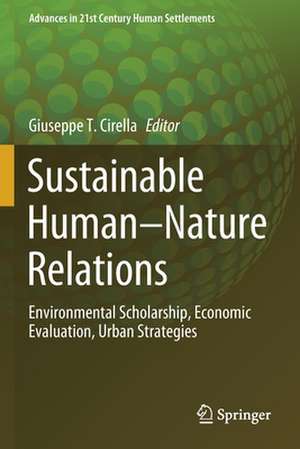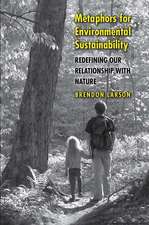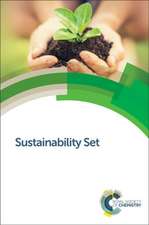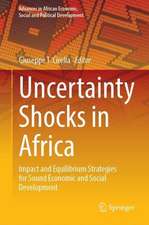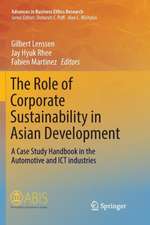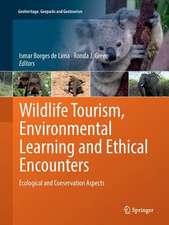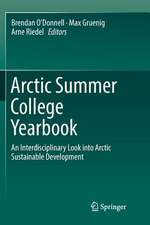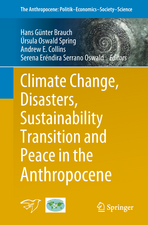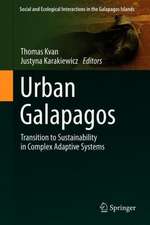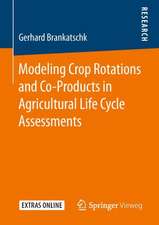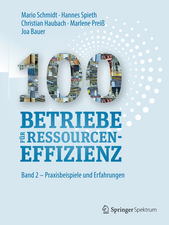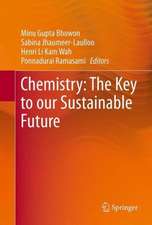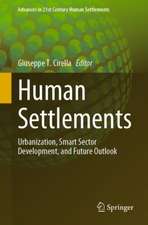Sustainable Human–Nature Relations: Environmental Scholarship, Economic Evaluation, Urban Strategies: Advances in 21st Century Human Settlements
Editat de Giuseppe T. Cirellaen Limba Engleză Paperback – 4 apr 2021
This book addresses sustainability thinking and the bigger picture, by taking into consideration how and from where contemporary schools of thought emerged approximately a quarter-century ago. Evidence from the literature illustrates a number of key concepts and techniques that have been tested and continue to be tested, within various multi-disciplinary fields, on societal functionality. Research into sustainable societies needs to be sound, ethical, and creative. A cross-sectoral, interdisciplinary examination of challenges and strategies is used to interlink sustainability thinking and human-nature relations. With an ever-growing number of people now concentrated within urban areas, providing not only environmental quality and livable space, but also security and resilient urban systems, is becoming increasingly important. This urbanization trend has overlapped with environmental degradation, consumption of natural resources, habitat loss, and overall ecosystem change. Consequently, the goal is for cleaner, safer societies – with higher standards of living – to excel in support of current and future generational communities. The book tackles these challenges by integrating environmental scholarship, economic evaluation, and urban strategies under one umbrella of thought. The relational paradigms presented include examples that correlate developed and developing countries, socioeconomics and community development, and governance of knowledge and education. As such, the book argues, furthering of knowhow should be accessible and shared in order to achieve maximum innovation and benefit. Sustainability thinking, after all, is a metric for intrinsic human-nature relations in terms of past performance, present development, and future goals. This book discusses this metric and offers novel approaches to growing societies and what we can do next.
| Toate formatele și edițiile | Preț | Express |
|---|---|---|
| Paperback (1) | 582.63 lei 6-8 săpt. | |
| Springer Nature Singapore – 4 apr 2021 | 582.63 lei 6-8 săpt. | |
| Hardback (1) | 645.28 lei 6-8 săpt. | |
| Springer Nature Singapore – 4 apr 2020 | 645.28 lei 6-8 săpt. |
Din seria Advances in 21st Century Human Settlements
- 23%
 Preț: 1043.61 lei
Preț: 1043.61 lei - 15%
 Preț: 701.40 lei
Preț: 701.40 lei - 18%
 Preț: 1446.43 lei
Preț: 1446.43 lei -
 Preț: 132.70 lei
Preț: 132.70 lei - 18%
 Preț: 787.15 lei
Preț: 787.15 lei - 18%
 Preț: 725.75 lei
Preț: 725.75 lei - 18%
 Preț: 896.63 lei
Preț: 896.63 lei - 15%
 Preț: 632.19 lei
Preț: 632.19 lei - 15%
 Preț: 589.33 lei
Preț: 589.33 lei - 15%
 Preț: 640.71 lei
Preț: 640.71 lei - 18%
 Preț: 958.73 lei
Preț: 958.73 lei -
 Preț: 398.74 lei
Preț: 398.74 lei - 18%
 Preț: 902.55 lei
Preț: 902.55 lei - 18%
 Preț: 797.73 lei
Preț: 797.73 lei - 15%
 Preț: 584.92 lei
Preț: 584.92 lei - 15%
 Preț: 586.30 lei
Preț: 586.30 lei - 15%
 Preț: 652.31 lei
Preț: 652.31 lei - 18%
 Preț: 1113.09 lei
Preț: 1113.09 lei - 20%
 Preț: 1053.98 lei
Preț: 1053.98 lei -
 Preț: 482.94 lei
Preț: 482.94 lei - 18%
 Preț: 733.96 lei
Preț: 733.96 lei - 18%
 Preț: 1127.28 lei
Preț: 1127.28 lei - 18%
 Preț: 1235.43 lei
Preț: 1235.43 lei - 15%
 Preț: 581.44 lei
Preț: 581.44 lei - 15%
 Preț: 695.53 lei
Preț: 695.53 lei - 18%
 Preț: 1231.01 lei
Preț: 1231.01 lei - 23%
 Preț: 1119.83 lei
Preț: 1119.83 lei - 18%
 Preț: 730.02 lei
Preț: 730.02 lei - 15%
 Preț: 643.84 lei
Preț: 643.84 lei - 18%
 Preț: 728.91 lei
Preț: 728.91 lei - 18%
 Preț: 965.97 lei
Preț: 965.97 lei - 18%
 Preț: 958.25 lei
Preț: 958.25 lei - 18%
 Preț: 1861.71 lei
Preț: 1861.71 lei - 18%
 Preț: 1116.26 lei
Preț: 1116.26 lei - 18%
 Preț: 781.45 lei
Preț: 781.45 lei - 18%
 Preț: 900.49 lei
Preț: 900.49 lei
Preț: 582.63 lei
Preț vechi: 685.45 lei
-15% Nou
Puncte Express: 874
Preț estimativ în valută:
111.50€ • 121.07$ • 93.66£
111.50€ • 121.07$ • 93.66£
Carte tipărită la comandă
Livrare economică 22 aprilie-06 mai
Preluare comenzi: 021 569.72.76
Specificații
ISBN-13: 9789811530517
ISBN-10: 9811530513
Pagini: 240
Ilustrații: XXVI, 240 p. 74 illus., 69 illus. in color.
Dimensiuni: 155 x 235 mm
Greutate: 0.38 kg
Ediția:1st ed. 2020
Editura: Springer Nature Singapore
Colecția Springer
Seria Advances in 21st Century Human Settlements
Locul publicării:Singapore, Singapore
ISBN-10: 9811530513
Pagini: 240
Ilustrații: XXVI, 240 p. 74 illus., 69 illus. in color.
Dimensiuni: 155 x 235 mm
Greutate: 0.38 kg
Ediția:1st ed. 2020
Editura: Springer Nature Singapore
Colecția Springer
Seria Advances in 21st Century Human Settlements
Locul publicării:Singapore, Singapore
Cuprins
Human-nature relations: The unwanted filibuster.- Sociocultural carrying capacity: Impact of population growth in Rapa Nui.- Territorial integration of foreigners: Social sustainability of host societies.- Sustainable land reforms and irregular migration management.- Role of the international ecological network, Emerald, in the Western Balkans’ protected areas.- How efficient is urban land speculation?.- Land use change model comparison: Mae Sot Special Economic Zone.- Cohesion policy for Europe 2020.- Evaluating green infrastructure via unmanned aerial systems and optical imagery indices.- Urban sustainability: Integrating ecology in city design and planning.
Notă biografică
Dr. Cirella completed his Ph.D. at Griffith University, Australia. He is currently a Professor at the University of Gdansk, Poland, and also the Founder of the Polo Centre of Sustainability. His research interests are in the areas of sustainable development, consumption, globalisation and resources, sustainability indices and trends, human geography, and interdisciplinary societal studies.
Textul de pe ultima copertă
This book addresses sustainability thinking and the bigger picture, by taking into consideration how and from where contemporary schools of thought emerged approximately a quarter-century ago. Evidence from the literature illustrates a number of key concepts and techniques that have been tested and continue to be tested, within various multi-disciplinary fields, on societal functionality. Research into sustainable societies needs to be sound, ethical, and creative. A cross-sectoral, interdisciplinary examination of challenges and strategies is used to interlink sustainability thinking and human-nature relations. With an ever-growing number of people now concentrated within urban areas, providing not only environmental quality and livable space, but also security and resilient urban systems, is becoming increasingly important. This urbanization trend has overlapped with environmental degradation, consumption of natural resources, habitat loss, and overall ecosystem change. Consequently, the goal is for cleaner, safer societies – with higher standards of living – to excel in support of current and future generational communities. The book tackles these challenges by integrating environmental scholarship, economic evaluation, and urban strategies under one umbrella of thought. The relational paradigms presented include examples that correlate developed and developing countries, socioeconomics and community development, and governance of knowledge and education. As such, the book argues, furthering of knowhow should be accessible and shared in order to achieve maximum innovation and benefit. Sustainability thinking, after all, is a metric for intrinsic human-nature relations in terms of past performance, present development, and future goals. This book discusses this metric and offers novel approaches to growing societies and what we can do next.
Caracteristici
Highlights the link between societal changes and sustainable development Includes up-to-date case studies revealing emerging success stories from the developing world Contains a special chapter explaining how contemporary ideas of sustainability have been developed Illustrated with easy to read tables and figures showing challenges for contemporary society
